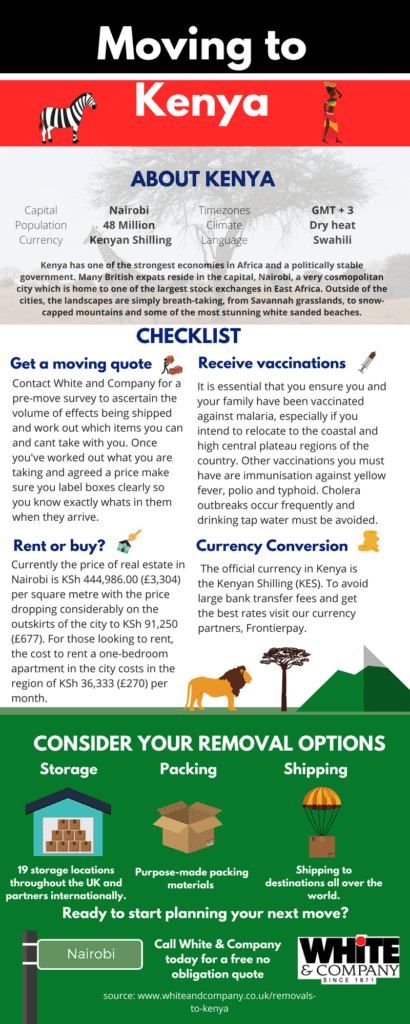Shipping to Kenya
Emigrating to a new country is an amazing opportunity but also a huge challenge. Most people look for a place that will offer them a good quality of life, an outdoor lifestyle and good opportunities for employment. Many people who retire to Kenya often choose to settle in and around the capital, Nairobi, although cities and towns along the Indian Ocean coastline are another popular choice.
With so many things to organise, the moving of your personal effects is one thing you needn’t stress over. At White & Company we have been moving families overseas for over 80 years and pride ourselves on our international removals service, which includes storage, packing and shipping.
Industry Associations
Most of our business comes from recommendations, a fact which we take great pride in. We know that sometimes things do not go according to plan so being members of FIDI, OMNI and BAR gives you that extra re-assurance that if you encounter any problems, you have someone knowledgeable to turn to.
So whether you’re ready or even just contemplating a move to Kenya, don’t hesitate to get in touch to discuss how we can make your dream move a reality.
Why Move to Kenya?
Kenya has one of the strongest economies in Africa and a politically stable government. Many British expats reside in the capital, Nairobi, a very cosmopolitan city which is home to one of the largest stock exchanges in East Africa. Traditionally, expats who moved to the country did so to work for charitable organisations and NGOs, and while this is still the case, lots now move for business and the luxurious expat lifestyle on offer, including larger houses, very high salaries and domestic help.
Outside of the cities, the landscapes are simply breath-taking, from Savannah grasslands, to snow-capped mountains. You are spoilt for choice on the Kenyan coast in terms of beaches, with Diani beach and Watamu offering some of the most glorious beach resorts, without the European crowds and price tag. The country plays host to some of the most spectacular wildlife in Africa. Safaris offer life changing encounters with some of the world’s greatest but unfortunately endangered creatures, including lions, cheetahs, elephants and black rhinos and are an opportunity not to be missed.
Local Hospitality
Above all else, expats who take the plunge and move to Kenya state that the greatest thing about the country is in fact its people. Kenyans are incredibly welcoming, humble and friendly people, who know how to enjoy and celebrate life. This can be seen in the many music and dance festivals staged whatever the weather and the diverse array of cuisine on offer. From chimichurri and Nyama Choma (roast beef), to Swahili cuisine and fish of every shape and size, it’s a feast for the taste buds.
So if you are weighing up a move to one of the fastest developing East African countries, then look no further than Kenya for an exciting chance to embrace a new culture and way of life with no shortage of breath-taking landscapes to explore and economic opportunities to unlock.
Working in Kenya
A large proportion of the country’s GDP comes from tourism. Although Kenya has one of the most productive economies in Africa, benefiting from its strong agricultural, manufacturing and real estate sectors. However, the economic reality on the ground can make it difficult to secure a job and the government make sure that companies first try to employ locals before attempting to employ foreign nationals.
Kenya employs most of its foreign workers in the areas of tourism, teaching and development. The best advice would be to secure a job with an American or European company prior to arrival. There are some big businesses located in Kenya, including General Electric, Nokia, Coca-Cola and Toyota, all of which higher expats for a variety of different roles.
In most commercial working environments English will be used as the language of business, however, Swahili is the official language. As such some knowledge and level of proficiency will go a long way in successfully conducting both business and personal affairs.
Visas
Foreigners who want to own, or run a business in Kenya, need to have a work permit issued by the Ministry of Immigration. There are two types of permits: A Class H permit (for a business owner) or a Class A permit (an employee).
For help finding employment and applying for a visa in Kenya visit the following web sites:
Property
Purchasing property can be a little complicated but not altogether impossible. Foreigners can buy ‘commercial class’ land in Kenya, a type of land made available for income or revenue-making purposes, which they can build on. As with all forays into purchasing property abroad the first step to purchasing property in Kenya is to hire a reputable real estate lawyer.
There are some wonderful gated communities and leafy suburbs that have beautiful houses even foreign investors are buying in. For those residing in Nairobi for work Karen or Westlands are both popular choices. Karen tends to be more popular with families and has a well established expat community.
Whereas, Westlands, or ‘Westie’ as it is know by locals, is an up and coming residential and commercial district which is also home to Google Kenya.
Prices
Currently the price of real estate in Nairobi is KSh 444,986.00 (£3,304) per square metre with the price dropping considerably on the outskirts of the city to KSh 91,250 (£677). For those looking to rent before they buy or perhaps for those only looking to stay for work short term, renting is a cheap and attractive alternative to home ownership in Kenya. The cost to rent a one-bedroom apartment in the city costs in the region of KSh 36,333 (£270) per month and on the outskirts can drop to as little as £138.
The following web sites will assist you with your property search:
kenyahomesguide.com/587/buying-a-house-in-kenya/
www.expatarrivals.com/kenya/accommodation-in-kenya
www.onthemarket.com/overseas/property/kenya/
General Information
Moving to Kenya is a thrilling opportunity, but also one that requires dedication, plenty of organisation and time to research. For some helpful tips and information on settling into life in Kenya, it is well worth taking the time to visit some of the many expat forums online.
Travel
Public transport is limited in Kenya and Nairobi is the only city with an effective municipal bus service. Many local people use matatu (or matatus) which are privately owned minibuses, although these can be very cramped and often badly maintained. Shared Peugeot taxis are a good alternative to matatus and offer a regular service which takes around 9 passengers and leave once full.
Boda-bodas (bicycle or motorcycle taxis) are also common in areas where standard taxis are hard to find, and operate in smaller towns and cities such as Nakuru or Kisumu. Kenya’s railway system links the nation’s ports and major cities, connecting it with neighbouring Uganda.
You can drive for up to 3 months using a UK driving licence. For longer stays, you’ll need to get a Kenyan driving licence. Currently there are several areas near the coast where it’s inadvisable to drive, especially near the border with Somalia. You’ll find that road quality is generally good in and around the towns and cities although regularly jammed with traffic.
The only must have documentation for drivers is a recognised driver’s licence but it’s worth having your vehicle registration document and insurance certificate to hand. It can be a good idea to have a copy of your passport details with you too for identification purposes.
Healthcare
There is a national healthcare plan in Kenya that all civil servants are required to join. Expats are eligible to take advantage of this, but most don’t as healthcare services aren’t up to the standards they’re accustomed to and enrolling can prove a bureaucratic nightmare with long waiting lists.
It is therefore essential for expats to ensure that they have adequate health care cover before arriving in Kenya. Without it, healthcare costs are just as expensive as in Western countries and depending on the treatment it can run into thousands of dollars.
Kenya’s private health sector is one of the most advanced and dynamic in Sub-Saharan Africa and is the main source of healthcare. It offers modern facilities and mostly English speaking well trained staff. However, the quality of care provision can vary enormously from area to area.
Vaccinations
It is also essential that you ensure you and your family have been vaccinated against malaria, especially if you intend to relocate to the coastal and high central plateau regions of the country. Other vaccinations you must have are immunisation against yellow fever, polio and typhoid. Cholera outbreaks occur frequently and drinking tap water must be avoided. Pharmacies in Kenya are also referred to as chemists and expats can easily find these in any of its major towns or cities.
For further advice on healthcare provision in Kenya visit the following sites:
www.expatarrivals.com/kenya/healthcare-in-kenya
www.allianzworldwidecare.com
Schools
Kenya’s education system has undergone many changes over the past few years. There are some very good government schools, but most expats will still decide to educate their children at an international school.
Most international schools will be found in Nairobi. The fees are usually high, and it would be wise to negotiate an allowance for this when agreeing a salary package. Hillcrest and the International School of Nairobi are both considered excellent options for those wishing to enrol their child in a school which offers a Western curriculum and course of examination.

White & Company
Providing International Removals since 1871
We recommend a visit from one of our Surveyors for all International moves, so that we can assess your requirements, and the volume of goods to be moved.
Popular Places to Relocate in in Kenya
- Bungoma
- Eldoret
- Garissa
- Kakamega
- Kisii
- Kisumu
- Kitale
- Machakos
- Malindi
- Meru
- Mombasa
- Nairobi
- Nakuru
- Nanyuki
- Thika










